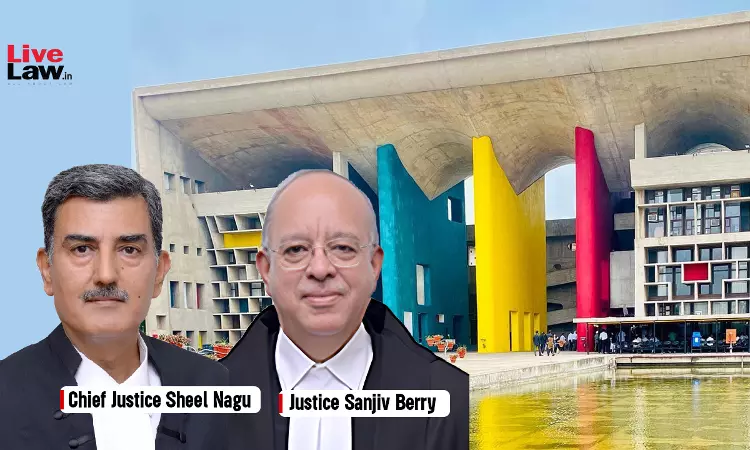P&H High Court Criticizes Ex-Judge For 'Unsubstantiated' Adverse Remarks Leading To Compulsory Retirement Of District Judge
Aiman J. Chishti
16 Sept 2025 1:32 PM IST

The Punjab and Haryana High Court has criticised its former judge, Justice Alok Singh, for making adverse remarks in the Annual Confidential Report (ACR) of a district judge that ultimately led to the latter's compulsory retirement.
Justice Alok Singh was administrative judge of the Sirsa District, who made adverse remarks in the last five months of the appraisal year 2010-2011 against a District Judge Shiva Sharma who had earned 'Good' and 'Very Good' remark in his 30 years of service.
The adverse remarks made by Justice Singh were found to be "not based on any written complaints, verified material or inquiry", rather they were founded on unsubstantiated material or allegations.
Chief Justice Sheel Nagu and Justice Sanjiv Berry said, "The irrelevant material of the adverse remarks in the last five months of the ACR for the appraisal year 2010-2011, recorded by the then Administrative Judge, Hon'ble Mr. Justice Alok Singh were further taken into account, by ignoring the fact that an Officer who had earned 'Good' or 'Very Good' remarks throughout his entire service career of 30 years, cannot overnight become bad to the extent of rendering his 'Integrity Doubtful'."
The Court added that, "No man of ordinary prudence can take a such decision, and, therefore, the impugned decision assailed herein abhorrent to the Wednesbury principle. The Competent Authority in all probability did not notice the element of malafide in law, which became palpable in the present case, especially on the part of the Administrative Judge, who recorded adverse remarks in the last five months of the ACR of petitioner, for the appraisal year 2010-2011."
Perusing the records, the division bench said, "It is difficult to comprehend that an Officer who had no adverse remarks in his entire career spanning 30 years, behaved and conducted himself in such a manner, compelling the concerned Administrative Judge to categorise the petitioner from 'Very Good' in 2009-10, down to 'C' (doubtful integrity)."
While noting that Administrative Judge Justice Alok Singh carried out the inspection for 2010-2011, the Court observed, "He found that an Officer who had rendered 'Good' or 'Very Good' performance in his entire 30 years of service, suddenly became an officer of worst reputation with his 'Integrity Doubtful' who exercises discriminatory tactics while recording remarks in the ACR's of Subordinate Judicial Officers."
All these adverse remarks written in the last five months of the appraisal year 2010-2011 were not based on any written complaints or verified material or any overt or covert inquiry, but on unsubstantiated material/evidence/allegations, it added.
The Court opined that the least the then Administrative Judge Justice Singh ought to have done, is to conduct a covert vigilance inquiry, asking for the response of the petitioner. If such an inquiry would have revealed, some prima facie material of petitioner having committed misconduct, then proper course would have been to initiate a regular inquiry, after affording due and sufficient opportunity to the petitioner to defend himself.
"None of these steps were adopted. Instead, the short-cut method was adopted by declaring the petitioner to be unfit to be retained in service at the age of 58 years, by way of compulsory retirement in public interest," it added.
The bench clarified that no doubt an order of compulsory retirement in public interest is not a punishment, but the same has to be issued only after due application of mind, to the relevant material/evidence available on record.
While assessing an officer to be entitled or not, the concerned Competent Authority needs to scrutinise the entire service records of the officer right from the initial appointment upto the last appraisal year, with more emphasis on the performance in the last few years of service, the bench said.
The Court further observed that, "It is well settled principle of service jurisprudence that while applying its mind on the question of compulsory retirement in public interest, the Authority needs to ensure that only relevant material necessary for taking the crucial decision is considered, while the irrelevant material is discarded."
Consequently, the Court set aside the impugned order of Compulsory Retirement of the petitioner in public interest at the age of 58 years, calling it to be "vitiated by illegality, impropriety and mala fide in law."
The bench held that the petitioner is further entitled to all consequential benefits including notional seniority, pay fixation. Fixation of pension, payment of arrears of pension, except payment of arrears of salary for the period, he remained out of service.
Mr. S.K. Garg Narwana, Sr. Advocate (Arguing Counsel) with Mr. Arav Gupta, Advocate for the petitioner.
Mr. Sumeet Mahajan, Sr. Advocate (Arguing Counsel) with Ms. Shruti Singla, Advocate and Ms. Balpreet K. Sidhu, Advocate for respondent-High Court.
Mr. Deepak Balyan, Addl. Advocate General, Haryana.
Title: DR. SHIVA SHARMA v. HIGH COURT OF PUNJAB AND HARYANA AND ANOTHER


